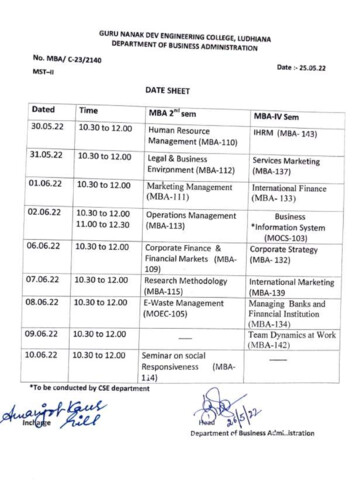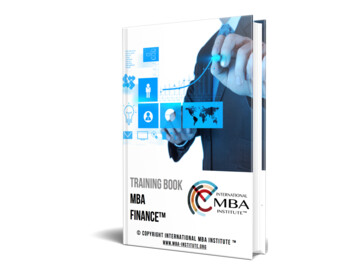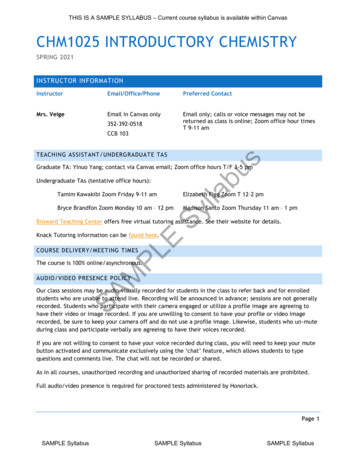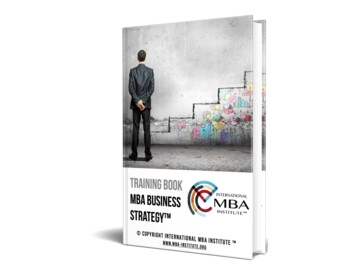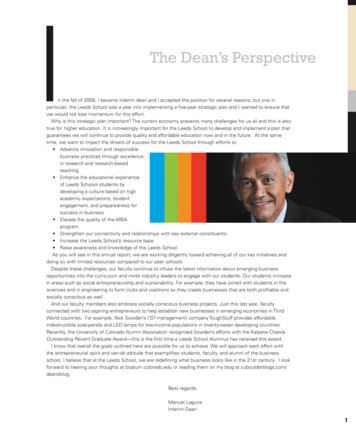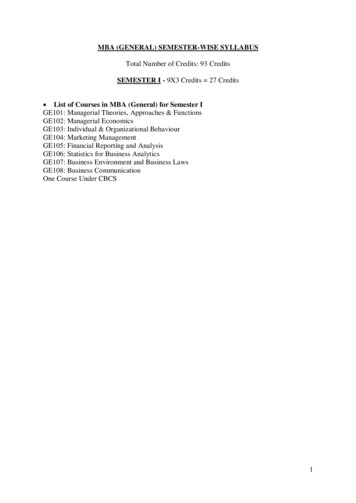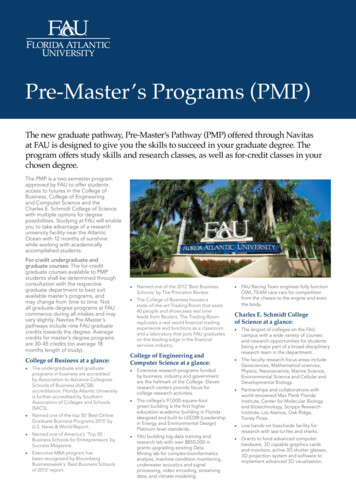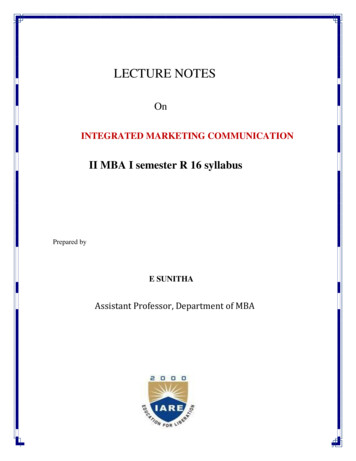
Transcription
Faculty of ManagementDepartment of Business AdministrationM.J.P. Rohilkhand UniversityBareilly – 243 001 (U.P.)SyllabusMBA (General) Two YearsFull Time ProgrammeMBA(Gen.)- I SemesterManagement Concepts and Skill DevelopmentPAPER CODE : CN-101Objectives : The objective of this course is to develop a basic understanding about the managementconcepts as well as of human in various managerial processes in organisation .UNIT-IManagement : Definition, nature, process , functions & skills . Evolution of management thoughts - F.W.Taylor, Henri Fayol, Max Weber , Elton Mayo . Management Approachs- System approach , Contingencyapproach . Business Organisation - Types of ownership .UNIT-IIPlanning : Concept and purpose , Planning Process , Management by Objectives(MBO), Decision Making .Organisation : Concept and purpose of organisation , Types of organisation , Line, Line & Staff , Matrix ,Virtual Organisation structures . Basis of Departmentation , Concept of Authority, Functional Authority,Delegation of Authority , Centralisation and Decentralisation of Authority. Coordination . Staffing .UNIT-IIIDirecting : Leadership - Concept , Traits, Styles . Communication : Concept, Types , process, barriers, makingCommunication effective .Controlling : Concept, process, Requirement for Adequate control , Budgetory Control , Non-BudgetoryControl .UNIT-IVBusiness Process Re-engineering - Concept , Process, Redesign, BPR, experiences in Indian Industry .Total Quality Management(TQM) - Concept , Systems model of Quality, Deming's approach, TQM as abusiness Strategy .Knowledge Management (KM)- What , why, how, of Knowledge Management , KM process , approach,strategies, tools.
E-commerce- Ideology, methodology, classification by application /nature of transactions , Driving Forces ofEC, Impact of EC, Scope .UNIT-VSkill Development - Writing Business Letter, Official letters, 7C's & 4'S in Communication , Report writingSkills, Presentation Skills .Suggested Readings :1. Stoner, Freeman , Gilbert Jr. : Management (Pearson education)2. Kootz,O'Donnell , Weighrich : Essentials of Management3. Michael , J. Stahl : Management -Total Quality in a global environment ( Blackwell Business)4. Newman , Warren and Summer : The Process of Management , Concept, Behaviour & Practice .5. Brech , E.F.L. : Principles and Practice of Management6. Drucker , P.F. : Managements , Tasks , Responsibilities , Practices7. Asha Kaul : Effective Business Communication (PHI)8. RonLudlow, Fergus Panton : The Essence of Effective Communication(PHI)9. Efrain , jae, david , H. Micheal : Electronic Commerce : A Managerial Perspective (Pearson Education)10. Carr D.K. and Johansson H.J. - Best Practices in Re-engineering (MGH)11. Jayaraman M.S.: Business Process Re-engineering (TMG)MBA(Gen.)- I SemesterStatistics for Business DecisionsPAPER CODE : CN-102Objectives : The basic aim of this course is to impart knowledgeof basic statistical tools & techniques withemphasis on their application in Business decision process and Management.UNIT-IStatistics : Concept, Significance and Limitations . Collection of Primary and Secondary Data, Classificationaand Tabulation , Frequency Distributions and their graphical representation.UNIT-IIMeasures of Central Tendency : Mean, Median and Mode . Measures of Dispersion : Range, Mean Deviation ,Standard Deviation and Quartile Deviation . Moments , Measures of Skewness and Kurtosis .UNIT-IIIProbability : Classical , Relative and Subjective Probability . Additive and Multiplicative rules ; ConditionalProbability and Baye's Theorem . Random Variable , Mathematical Expectation , Binomial , Poisson andNormal probability distributions.UNIT-IVSampling : Methods of Sampling ; Sampling and Non-Sampling Errors ; Law of Large Numbers and CentralLimit Theorem (without proof) .Estimation , Point & Interval Estimates , Confidence Intervals .Statistical Testing - Hypothesis and Errors ; Large and Small One Sample and Two sample Tests - Z test, t -testand F-Test.Chi-Square as a test of Independence and as a test of Goodness of Fit ,Analysis of Variance .
UNIT-VCorrelation and Regression Analysis : Two variable case / Index Numbers ; Time series - its components andtheir determination .Suggested Books :1.2.3.4.Levin , R.I. : Statistics for Management(PHI)Gupta , S.P. & Gupta , M.P. : Business StatisticsLapin , Lawrance : Statistics for Modern Business Decisions (HBJ)Shenoy , G.V. & Pant, M : Statistical Methods in Business and Social SciencessMBA(Gen.)- I SemesterManagerial EconomicsPAPER CODE : CN-103Objectives: The basic objectives of this course is to familiarise the students with the concepts and tools ofmanagerial Economics as applicable to decisions making in contemporary business environment .UNIT-INature and scope of Managerial Economics : nature and scope of Managerial Economics , its relationship withsubjects . Objective of Firm, Fundamental Economic concepts- Opportunity cost concept , Incremental concept,Priciple of the persepective , Discounting priciple and Equimarginal priciple .UNIT-IIDemand Analysis : Concept and importance of Demand & its determinants , Income & Substitution effect,Various elasticities of demand , using elasticities in managerial decisions , revenue concepts, relevance ofdemand forecasting , methods of demand forecasting .UNIT-IIICost Concept and Production Theory : Various cost concepts & classifications, Cost output relationship - inshort run and in long run , (cost curves), Economies of scale , cost control and cost reduction , Productionfunction , managerial uses of production function , Indifferent curves.UNIT-IVPricing Decisions : Pricing methods , Price Discremenation , Price and output decisions under defferent marketstructures - Perfect competition, Monopoly and Monopolistic Competition , Oligopoly .UNIT-VProfit & Inflation : Profit, Functions of profit, profit maximisation , Break Even analysis , Inflation - Types, interms of demand pull & cost factors , effects of inflation .Suggested Readings :1. Varsney & Maheshwari :2. Mote, Paul & Gupta3. D.N. Dwivedi4. D.C. Hague5. Peterson & Lewis6. Trivedi7. D. GopalkrishanManagerial EconomicsManagerial Economics: Concepts & CasesManagerial EconomicsManagerial EconomicsManagerial EconomicsManagerial EconomicsA study of Managerial Economics
8. Habib-Ur-RehmanManagerial EconomicsMBA(Gen.)- I SemesterHuman Resource ManagementPAPER CODE : CN-104Objectives : The courseaims at developing a basic understanding in the students of the issues relating toprocurement , development , appraisal, compensation , integration etc. of human resource for its optimumutilization and productivity in the organisation in the context of dynamic business environment .UNIT-IHuman Resource Management : Concept , objectives , scope, functions , importance, Human ResourcePlanning : Meaning , Objectives, process, limitations, importance , responsibility for human resource planning .UNIT-IIRecruitment and Selection : Meaning , sources of recruitment , selection process , induction.UNIT-IIITraining and Development : Meaning , identification of training and development needs , methods of trainingand development , evaluation of training and development programmes, significance of training anddevelopment , career development .UNIT-IVPerformance appraisal : Meaning , process , methods, limitations, importance, internal mobility , separation.UNIT-VWage and Salary Administration : Concept, objectives, factors influencing wage and salary administration . Jobevaluation : meaning , principles, methods, limitations, importance , Systems of payment : Time rate system ,piece rate system , Incentive payments .Fringe benefits, Executive compensation .Suggested Readings :1.2.3.4.5.6.7.8.9.David A. De Cenze & Stephen P. Robbins : Personnel/Human Resource managementRudrabasavarj , M.N. : Dynamic Personnel Administration: management of Human ResourceP. Subba rao : Essentials of Human Resource Management & Industrial RelationsC.B. Mamorai : Personnel ManagementDale Yoder & Paul Staudohar : Personnel Management & Industrial RelationsBeach : Personnel- The Management of People at workStrauss G & Sayles , L.R. : The Human Problems of ManagementJucius , M.C. : Personnel ManagementFlippo, Edwin ,B : Personnel ManagementMBA(Gen.)- I SemesterMarketing ManagementPAPER CODE : CN-105
ObjectiveThe objective of this course is to facilitate understanding of the conceptual framework of marketing and its applications indecision making under various environmental constraints.UNIT-IIntroduction: Concept, nature, scope and importance of marketing; Marketing concept and its evolution; Marketing mix;Strategic marketing planning – an overview.Market Analysis and Selection: Marketing environment – macro and micro components and their impact on marketingdecisions; Market segmentation and positioning; Buyer behavior; consumer versus organizational buyers; Consumerdecision making process.UNIT-IIProduct Decisions: Concept of a product; Classification of products; Major product decisions; Product line and productmix; Branding; Packaging and labeling; Product life cycle – strategic implications; New product development andconsumer adoption process.Pricing Decisions: Factors affecting price determination; Pricing policies and strategies; Discounts and rebates.UNIT-IIIDistribution Channels and Physical Distribution Decisions: Nature, functions, and types of distribution channels;Distribution channel intermediaries; Channel management decisions; Retailing and wholesaling.Promotion Decisions: Communication Process; Promotion mix – advertising, personal selling, sales promotion, publicityand public relations; Determining advertising budget; Copy designing and testing; Media selection; Advertisingeffectiveness; Sales promotion – tools and techniques.UNIT-IVMarketing Research: Meaning and scope of marketing research; Marketing research process.Marketing Organisation and Control: Organising and controlling marketing operations.UNIT-VIssues and Developments in Marketing: Social, ethical and legal aspects of marketing; Marketing of services; Internationmarketing; Green marketing; Cyber marketing; Relationship marketing and other developments of marketing.Suggested Readings :1. Kotlar, Philip, Marketing Management, Prentice Hall, New Delhi.2. Stanton, Etzel, Walker, Fundamentals of Marketing, Tata-McGraw Hill, New Delhi.3. Saxena, Rajan, Marketing Management, Tata-McGraw Hill, New Delhi.4. McCarthy, E.J., Basic Marketing: A managerial approach, Irwin, New York.MBA(Gen.)- I SemesterBusiness EthicsPAPER CODE : CN-106Objectives: The course aims to educate thathow the adoption of Business Ethics by organisations notonly discourages corporate wrong- doing , but also contributes substantially in the achievement of corporateexcellence.UNIT-IBusiness Ethics - An Overview - Concept, nature, evolving ethical values , Arguments against business Ethics.UNIT-II
Worklife in Indian Philosophy :- Indian ethos for worklife , Indian values for the work place , Work-LifeBalance .UNIT-IIIRelationaship between Ethics & Corporate Excellence - Corporate Mission Statement, Code of Ethics ,Organisational culture , TQM .UNIT-IVGandhian Philosophy of Wealth Management- Philosophy of Trusteeship, Gandhiji's Seven Greatest SocialSins .UNIT-VCorporate Social Responsibility - Social Responsibility of business with respect to different stakeholders ,Arguments for and against Social responsibility of business , Social Audit.Suggested Readings :1. Chakraborty , S.K. : ,Foundations of management Work - Contributions from Indian Thought: HimalayaPublishing House Delhi 19982. Griffiths , B. : Themarriage of East and West , colling London 19853. Gandhi , M.K. : The Study of My Experience with Truth, Navjivan Publishing House , Ahmedabad , 19724. Velasquez , M.G. : Business Ethics5. Sekhar , R.C. : Ethical Choices in Business .MBA(Gen.)- I SemesterFinancial Accounting and ReportingPAPER CODE : CN: 107Objective: The objectiveof this paper is to give exposure of the fundamentals of accounting and howfinancial statements are prepared and other related matters.UNIT -IFinancial Accounting - Nature and objectives , Use of financial statements , Users of Accounting information .Accounting Principles . Accounting Standards , Capital and Revenue receipts and payments .Origin and Analysis of Business Transaction. - Types of Accounts , Journal , Ledger and Trail Balance[including practical problems ]UNIT-IIDepreciation metheds and accounting - Inventory valuation techniques and accounting [including practicalproblems ]UNIT-IIIFinancial Statements of Trading Organisation - Preparation with adjustments , Final Accounts of LimitedLiability companies , P/L Account , P/L Appropriate A/C, Balance Sheet .UNIT-IVCompany Accounts : Issues of shares and debenture and their redemption . Accounting Policy and Trends inCorporate Reporting .
UNIT -VValue added reporting - value added statements , EVA Concept and its application in India , EnvironmentalAccounting & Reporting : environmental Costs , Guidelines for environmental reporting .Suggested Readings :1. Financial Accounting : Ashok , Deepak , Sehgel2. Financial Accounting : Ashish , K. Bhattacharya3. Jawaharlal : Corporate Financial Reporting theory and Practice , Taxamann , New DelhiPaper Setting GuidelinesUNIT-I - One Numerical and one theoretical .UNIT-II -- Two Numerical Questions .UNIT-III Two Numerical QuestionsUNIT IV- One Numerical and one theoreticalUNIT V - Two Theoretical QuestionsMBA(Gen.)- I SemesterComputer Applications in ManagementPAPER CODE : CN-108Objectives : The objectives of this course include developing an appreciation of different software &Hardware system available in the industry among the participants and bulid up the experience of computerusage in business organisation with specific reference to database, Networking & Communication , spreadsheet& Operating System .UNIT-IAn Introduction of Computers : Generation of Computers, Organisation of Computer, Components ofComputers , Number Systems (Binary, Octel ,Hexadecimal ) , Data Processing : Types , Data processing cycle ,Computer in Business .UNIT-IIPersonel Computers : PC & Types of Computers, Primary & Secondary storage device, other peripherals usedwith PC , Computer languages.UNIT-IIIIntroduction to Operating System : Types of Softwares, Types of O.S. , Concept of MS-DOS : Internal &External Commands . Path, prompt, rmdir, time,ver, vol,echo, chkdsk, diskcopy, label, scandisk, replace,format, fdisk.Windows - Windows explorer, print manager, control panel, paint brush . Dialog box: text box, check box,slide boxes, Desktop .UNIT-IVData Communication & Networks : Introduction of Communication, Commnication Medias, CommunicationModes, Switching techniques, Networks: Goals of Networks, Types of Networks, Client/Server Computing ,Network Topologies, MODEM, Gateways, Multiplexer, Bridges, Routers. Ethernet.UNIT-V
Spreadsheet Software : Introduction of spreadsheet software, creating , Range, formulas, Functions, databasesfunctions in spreadsheet, Graphs on Spreadsheet, data validation , Application of MS-Excel in Business .Suggested Books :1.2.3.4.5.Summer ,M. : Computers Concepts and Uses , Englewood Cliffs, New Jersey , PHIV. Rajaraman : Fundamental of ComputersPeter Norton : Introduction to MS-DOSO.Brian, J.A. : MIS , TMHComputer Networks : TannenbaumMBA(Gen.)- II SemesterOrganisational BehaviourPAPER CODE : CN-201ObjectiveTo have an understanding about how people interact in an organisation and also to help an individual to have abetter understanding about one’s ownself.Unit-IConcept of Organisation Behaviour :Introduction : nature of OB, caused nature of Behaviour, S - O - Bmodel, Individual differences, Model’s of man.Unit-IIPsychological foundation of Human Behaviour:· Perception : Concept and Process· Learning: Classical and operant Conditioning theories and their application, reinforcement schedule, OBmodifications.· Personality: Factors, Theories of personality, values and attitudesUnit-IIIInterpersonal Relations:· Transactional Analysis: role of self concept, ego states, Life positions, Life script ,strokes etc. in TA, type oftransactions, psychological games.· Group Dynamics: Concept, group norms, group status, group cohesiveness.· Leadership Theories: Trait, Behavioural and Situational.Unit- IVDynamics of Organisation Behaviour:· Motivation Theories: Maslow’s Need Hierarchy theory, Herzberg’s Two Factor theory, Adam Equitytheory, McGregor theory X and Y, Vrooms Expectancy theory· Organisational Climate : Job Satisfaction, Morale· Stress : Nature, causes and strategies to cope up with stress.Unit- VOrganisational System :· Organisational Conflict: Types, Conflict resolution techniques and styles.· Organisational Change: Types of change, reasons for change, change process, resistance to change,overcoming resistance.· Organisational Development : Objectives, characteristics, process, OD intervention strategies.Suggested Readings :1.2.3.4.Robbins: Organisational Behaviour concepts, Controversies and applications.Fred Luthans: Organisationl BehaviourPaul Hersey Blanchard : Management of Organisational BehaviourKeith Davis: Introduction to Behavioural Science for Business
5. VSP Rao & PS Narayana: Organisation Theory & Behaviour6. L.M. Prasad : Organisation Theory & Behaviour.MBA(Gen.)- II SemesterInternational BusinessPAPER CODE : CN-202ObjectiveThis course exposes the student to the environmental dynamics of international business and its impact oninternational business operations of a firm .Unit IConcept ; Domestic to Transnational Business ; Driving and Restraining Forces ; Characterstics and role ofMNCs.Advantages and Disadvantages of Free trade ; The case for protection ; Forms of Restriction ; Effects ofprotection.Unit IIClassical trade theory ; Theory of comparative costs in terms of money ; Evaluation of comarative costs theory ;General Equilibrium Approach ; Hebkscher-Ohlin Factor – Price Equalisation theory ; Influence of factormobility on volume of trade ; country similarity theoryGains and terms of trade ; Balance of trade and Balance of payments.Unit IIIInternational business environment – The economic environment ; social and cultural environment, political,legal and regulatory environment, natural environment. Technological environment .Unit IVInternational Institution Systems – IMF, World Bank and WTO(all in brief), / Regional economic integration;impact of integration; European Union; NAFTA;ASEAN; SAARCUnit VStrategy of International Business – Strategy, planning, organisational structure and process of control. Recentdevelopments in international business.Suggested Readings :12345Cherunilam, Francis – International Business(PHI)Misra, S. & Yadav, P.K. – International Business(PHI)Aswathapa, K – International Business (Tata McGraw Hill )Sharan, Vyuptakesh – International Business (Pearson EducationVarshney R.L. and Bhattacharya ,B– International Marketing Management (Sultan Chand & Sons)MBA(Gen.)- II SemesterQuantitative TechniquesPAPER CODE : CN-203ObjectiveThis course is designed to acquaint the students with the important quantitative techniques which play animportant role in the decision making process. The emphasis will be given on their specific applications tobusiness problems.Unit-IIntroduction to Quantitative Techniques & Linear Programming:Concept of Model Building for Business Decisions, Role and Scope of Models in Business and Industry.
LPP-Problem formulation, Graphic method, Simplex method including Big M method & Duality.Unit-IITransportation and Assignment Problems:Transportation-NWCR, Matrix Minima & VAM Methods. Degeneracy & Optimum Solution.Assignment Problems & Routing Problems.Unit-IIIDecision Theory & Games Theory:Decision making under Uncertainty-Criteria of Maximax, Maximin, MiniMax Regret, Laplace & Hurwicz.Decision making under risk- Crietria of EMV & EOL. Decision Tree Approach and its application.Types of Games, Pure Strategy and Mixed Strategy.Unit-IVInventory Management & Replacement Theory:Types of Inventory, Inventory Management Systems, Safety Stock, Approaches to Inventory Control.Replacement policy for items & staff.Unit-VQueuing Models & Network Techniques:Population and Queue discipline, Channels and Phases, Single Phase-Single Channel Queue Models.CPM and PERT Models.Suggested Readings :1.2.3.4.5.6.U.K. SrivastavaLevin and KirpatricTahaKothari, C.L.Kanti SwaroopAckoff and Saisini::::::Quantitative TechniquesQuantitative Approaches to ManagementOperations ResearchQuantitative TechniquesOperation ResearchFundamentals of Operation ResearchMBA(Gen.)- II SemesterAccounting for Decisions MakingPAPER CODE : CN-204ObjectiveTo get acquainted with tools and techniques of Management accounting and their application in decisionmaking process of management.UNIT- IAccounting for Management - Nature and scope , Role of Management Accounting ,Differences with financialaccounting . Analysis of Financial statement - Ratio Analysis - Profitability , Turnover and Solvency Ratios ,Funds Flow and cash flow analysis.UNIT -IICost Classifications, Activity based Costing - Kaplan & Cooper's approach to ABC - How to develop ABCsystem , How ABC system supports corporate strategy . when to use ABC, Learning curve model - learningcurve , Value Chain Analysis , Target Costing , Life cycle Costing .UNIT -IIIMarginal Costing and Cost -Volume -Profit Analysis - Practical applications of Marginal Costing techniques ,BEP analysis , P/V Ratio and their applications in solutions to business problems .UNIT-IVBudgeting and Budgeting Control - Flexible Budgets and cash Budgets , Capital Budgeting -Pay Back Period ,NPV,IRR and ARR methods and their practical applications.
UNIT -VVariance Analysis - Material and labour variances . Capacity Management - Capacity Planning , levels ofactivity, approaches to capacity determination and utilisation , Guidelines on Capacity Determination. TransferPricing Techniques.Suggested Readings:1.2.3.4.5.6.Anthony R N and Reece JS. Accounting Principles , Hoomwood illinos , Richard D. IrvinBhattacharya SK and Dearden J. - Accounting for Management . Text and Cases , New Delhi.Hingorani NL and ramanthan AR - Management Accounting , New DelhiRavi M. Kishore , Advanced management Accounting , Taxmann , NewDelhiMaheshwari SN - Management and Cost Accounting , Sultan Chand , New DelhiGupta , SP - Management Accounting , Sahitya Bhawan , Agra .Paper Setting Guidelines :UNIT-I - Two Numerical questions .UNIT-II - One Numerical and one theoretical Question .UNIT-III- Two Numerical QuestionsUNIT IV- Two Numerical QuestionsUNIT V - One Numerical and one theoretical QuestionMBA(Gen.)- II SemesterFinancial ManagementPAPER CODE : CN-205ObjectiveObjectives of this course is to development a conceptual work of finance function and to main particulars withthe tools technique and process of financial management in the financial decision making.Unit-IIntroductory :Nature of concept of finance function, Distinction between Accounting and Finance function.Objectives of Financial Management – Profitability vs wealth Maximisation Organisation for finance function,Time valuation concept, compound value concept. Present value concept, Financial planning and financialforecasting.Unit-IICapital Structure planning : Patterns of financial requirement, objectives of an optimum capital structure,security Mix, Capitalisation concept, causes. Consequences and Remedies of over capitalisation and undercapitalisation. Capital structure theories ( with numerical problems) .Sources of long term finance share andDebentures. New financial Instruments and Institutions Leverage Analysis.Unit-IIIManagement of fixed capital :Concept relevance and computation of cost of capital nature and scope ofcapital Budgeting, Capital Budgeting, Analysis of risk and uncertainty (numerical problems).Unit-IVManagement of working capital :Concepts of working capital, Nature and scope of working capitalmanagement, Approaches to the financing of current Assets determining the financing mix, Financing ofworking in India. Estimation of working capital ( with numerical problems ) .Unit-VManagement of Earnings:Nature and scope of management of earning. Dividend policy and DividendModels, Walter’s Model. Gordons Model. MM Hypothesis, pattern of dividend policies (with numericalproblems). Determinants of Dividend policy.
Suggested Readings :1.2.3.4.5.6.BrighamHome. Wachowiez InWestorn And BrighamVan- HomeI M PandayS. N. MaheshwariFinancial Management Theory And PracticeFundamentals Of Mancial Management.Management Finance.Financial Management And PolicyFinancial Management.Financial ManagementMBA(Gen.)- II SemesterBusiness EnvironmentPAPER CODE : CN-206ObjectiveThe course aims to educate the student with the different environmental factors which effect business . This course aimsto develop ability to understand and scan business environment in order to analyse the opportunities and take decisionsunder the uncertainty .UNIT-IConcept, Significance and nature of Business Environment ; Elements of environment - internal and external ;Different roles of government in relation to business ; Social Responsibilities of Business .UNIT-IIBroad profile of Indian Economy , Industrial Policy - its historical perspectice(inbrief) , Industrial PolicyLiberalisation .Economic Planning in India ; Rationale of economic planning , latest five year plan .UNIT-IIIPublic sector -its objectives and working , major problems of public sector enterprises ; Privatisation of publicsector enterprises - the issue involved .Role of Private and Joint Sectors.Securities Excahnge Board of India - Organisation and Role , Regulation of Mergers and Acquisitions.UNIT-IVCompetition Act ; Industries Development and Regulation Act ; Consumer Protection Act -its main provisions.UNIT-VLatest Export -Import Policy ; Foreign Exchange Management Act ; Globalisation and Business practices,WTO- objectives and Role in International trade .Suggested books :1.2.3.4.5.Francis CherunilamK. AshwathapaRudra DuttKuchhal S.C.Ghose P.K:::::Business EnvironmentBusiness EnvironmentIndian EcnomyIndustrial Economy of IndiaGovernment & IndustryMBA(Gen.)- II SemesterResearch MethodologyPAPER CODE : CN-207ObjectiveTo equip the students with the basic understanding of the research methodology & to provide an insight intothe analytical tools and techniques for the purpose of management decision making.
UNIT – IIntroduction – Meaning of Research; objectives of Research; Types of Research; Research Process ; ResearchProblem formulationUNIT – IIThe Design of Research – Research Design: Features of a good design; Different Research Designs.Measurement in Research: Data types; Sources of Error; Tests of Sound Measurement. Scaling: Meaning &classification; Important Scaling Techniques; Scale construction TechniquesSampling Design: Census and Sample Survey; Steps in Sampling design; Types of Sample desighs- Probabilityand Non-Probability samplingUNIT – IIIMethods of Data Collection- Primary versus Secondary Data; Collection of Primary Data; Guidelines forconstructing questionnaire; Collection of Secondary data; Case study Method.Processing & Analysis of Data- Processing operations; Problems in processing; Types of Analysis; Descriptivemeasures [only theoretical] Correlation & Regression [only theoretical]UNIT – IVHypothesis Testing- Introduction; Parametric tests: Hypothesis testing of means; Difference between means;Proportions; Variance; Correlation Coefficients. Non-Parametric tests or Distribution-free test: Sign Test;Signed Rank test; Rank Sum tests; One sample Run test; Chi-square test.UNIT – VPresentation – Diagrams; graphs; charts.Report writing; Layout of Research report; Types of Reports; Mechanics of writing a Research report;Precaution for writing report; Oral presentation- preparation; Delivery; Audio Visuals.Suggested Books:1.2.3.4.5.Gupta, S.P. : Statistical Methods ( Sultan Chand)Kothari, C.R. : Research Methodology (Wiley Eastern)Krishnaswami; O.R. : Methodology of Research in Social Sciences ( Himalaya Publishing House)Salkind, N.: Exploring Research (Prentice Hall)Cooper, D.R. & Schindler, P.S. : Business Research Method (Tata McGraw Hill)MBA(Gen.)- II SemesterProduction & Operation ManagementPAPER CODE : CN-208ObjectiveThis course aims at acquiring the students with the basic management decisions with respect to productionfunction and designing of a production system .Unit-INature and scope of production & operations management , production functions , Responsibilities of theProduction Manager .Types of Manufacturing systems , Plant location and plant layout .Unit-IIProduction planning and control , Procedure , objectives and importance of production planning and productioncontrol , scheduling .Unit-IIIMaterials & stores management , Inventory control , relevant costs , economic lot size , inventory analysis , JIT,standardization & specialization, Automation .
Unit-IVWork study , Method study , work measurement , flow charts , industrial safety and health considerations ,maintenance of production facilities .Unit-VQuality control and inspection , sampling inspection , quality control charts , concept of TQM & ISO 9000.Suggested Readings :1.2.3.4.5.Goel B.S.:Mayers:Buffa:Moore FG & Hendrick :Chunawalla:Production & Operation ManagementProduction ManagementOperations ManagementProduction & Operation ManagementProduction ManagementMBA(Gen.)- III SemesterBusiness Policy & Strategic AnalysisPAPER CODE : CN-301Objectives:This course deals with corporate level Policy & Strategy formulation areas. This course aims todeveloping conceptual skills in this area as well as their application in the corporate world.UNIT-IBusiness Policy as a study ; Its Nature & Importance , Development & Classification of Business Policy;Mechanism or Policy making.UNIT-IITop Management its Responsibilities & tasks .Objectives of Busin
Syllabus MBA (General) Two Years Full Time Programme MBA(Gen.)- I Semester . MBA(Gen.)- I Semester Marketing Management PAPER CODE : CN-105 . Objective The objective of this course is to facilitate understanding of the conceptual framework of marketing and its applications in

